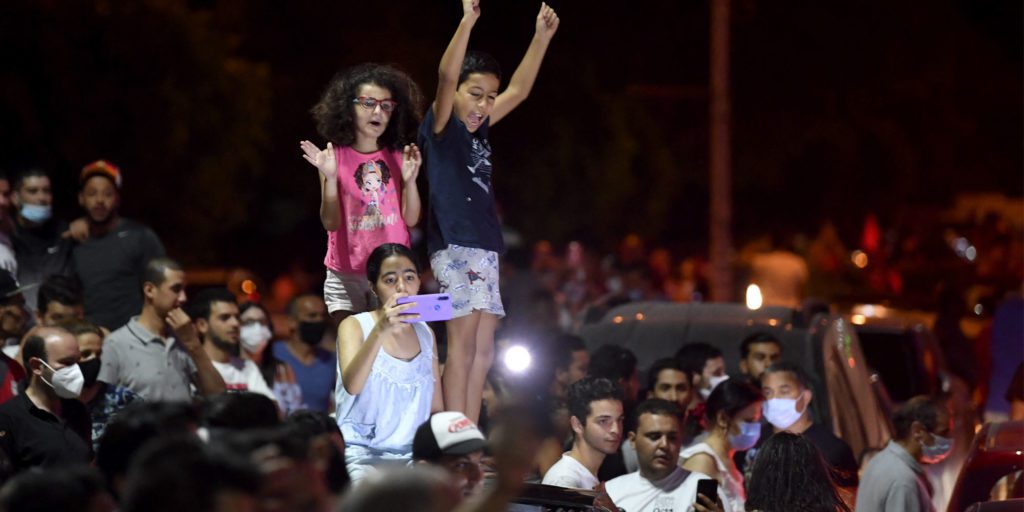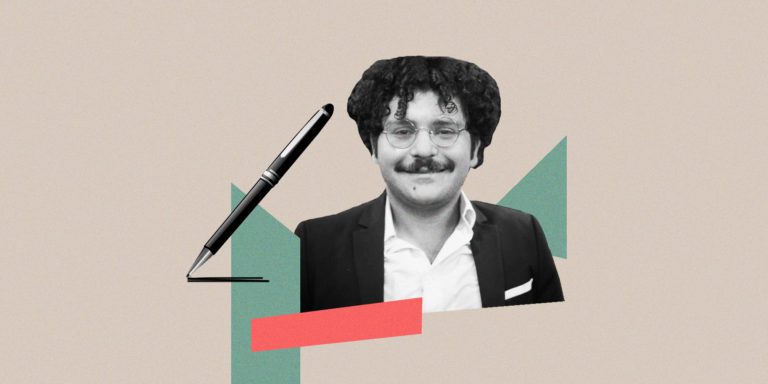“Sir, devourer of the constitution, you cannot cover up your coup with a woman’s dress. Have you heard, o oath breaker? You have only three endings. The end of your brother Hitler, who chose to commit suicide out of shame. An honorable end, which sees you resign out of respect for your country. Or a storm that sweeps your palace.”
This is an excerpt from the speech based on a poem by Ahmed Matar with which Tunisian TV host and journalist Amer Ayad addressed Tunisian President Kais Saied on October 2 on the Al-Zaytouna satellite channel.
It prompted an investigative military judge to issue an arrest warrant against Ayad in what has become publicly known as the “Ahmed Matar poem case.” Ayad was detained on October 3.
Ayad’s discourse, which followers of the Ennahda Movement and Saied opponents described as “fiery,” caused enormous controversy and triggered a lively debate in Tunisian media and human rights circles.
Some defended Ayad’s speech on the ground of freedom of opinion and expression, while others considered it an insult and an attempt to incite chaos, which should be punished. Among those who supported Ayad’s freedom of expression and his criticism of the president, many were surprised by his arrest for reciting the Ahmed Matar poem with its reference to Hitler.
According to Malik Ben Omar, a lawyer and member on Ayyad’s defense team, no journalist or any other media person is above the law. If Ayyad makes a mistake while exercising his profession, he must be tried according to Decree 115 on Freedom of the Press, Printing and Publishing. He should not be taken to military court.
“Military trials are a reminder of dictatorial regimes and one-man rule,” Ben Omar told Daraj. “It is known that President Saied does not trust the judiciary and therefore resorts to military courts.”
Ayad is facing a number of charges, including conspiring against state security, calling for disobedience, committing a brutal crime against the head of state, accusing a public official without providing proof, and harming the dignity and reputation of the army, which could weaken the military system.
Ayad is prosecuted for violating Article 72 of the Tunisian Penal Code, which stipulates that the perpetrator of an assault intended to alter state authority, compel the population to attack each other, stir up disorder, murder and robbery in Tunisian soil, shall be punished with the death penalty.
Political writer Monia Al-Arfaoui believes Ayad’s military trial is an extremely serious case, which should not take place in a democracy that supposedly ended the era of dictatorship, repression and restrictions on free speech.
Read Also:
A democracy must accept political opposition and criticism, while freedom of opinion and expression cannot be restricted with penalties for vague qualifications as “insulting dignity, defamation, and defamation of a public figure or institution.”
“Being a politician means that you have agreed to being cursed all your life,” she said. “Whoever practices politics and is in the spotlight, should not expect flowers. People will both applaud a politician and want to spit him in the face. I would like a thousand times more anarchic freedom, than to stand in a queue of good morals and discipline behind a ruler who only wants to hear the hiss of butterflies around him.”
Article 19 of the Universal Declaration of Human Rights states that: “Everyone has the right to freedom of opinion and expression. This right includes freedom to hold opinions without interference and to seek, receive and impart information and ideas through any media and regardless of frontiers.”
The Tunisian Constitution in article 31 acknowledges this, stating that: “Freedom of opinion, thought, expression, information and publication shall be guaranteed. These freedoms shall not be subject to prior censorship.”
Following Ayad’s arrest, the National Syndicate of Tunisian Journalists (NSTJ) issued a statement rejecting military trials of civilians on the basis of opinions, positions or publications. It called the trial a setback for freedom of expression and a blow to democracy. The NSTJ also rejected the practice of surveilling journalists and opinion makers, without explicitly naming Ayad.
Wajih El-Wafi, a member of the NSTJ executive office, told Daraj that it is possible Ayyad violated the law in some way during the TV program, but that is no excuse to prosecute him militarily and imprison him for merely having an opinion.
While rejecting Ayad’s discourse regarding the newly appointed Prime Minister Najla Boden, which it considered masculine and hostile towards women, the Tunisian Association for Rights and Freedoms, strongly condemned putting civilians on trial in military courts.
It furthermore demanded the immediate release of Ayad and called upon the Tunisian authorities to stop using military courts to silence critics and opponents of President Saied.
Lawyer Bin Omar believes the President is directly responsible for using military trials, pointing at the fact there are at least five cases pending in court that revolve around the issue of freedom of speech and political opposition to President Saied.
When former President Beji Caid Essebsi felt offended by what a citizen wrote about him, he filed a civilian case. And lost. The situation before July 25, when Saied suspended parliament, was not very rosy, but a lot less dangerous than it is today.
Civil rights and liberties have become a concern to everyone in Tunisia, not only because of the military trials, but also because of the electronic stalking campaigns of critics of Saied, in addition to the increase in police violence against citizens and activists that remains unpunished.
The latest incident concerned a policeman beating up queer activist Badr Baabo on October 21, which illustrates how the Tunisian state is under control of the security apparatus, empowered by a whole new set of arms, including military courts.
Read Also:








